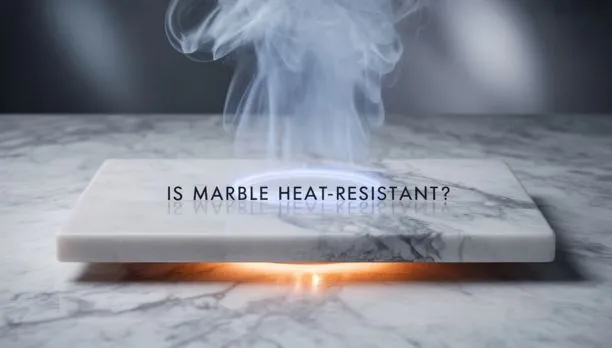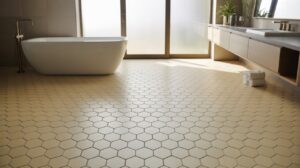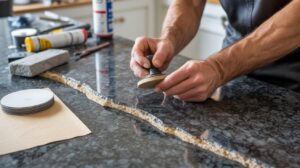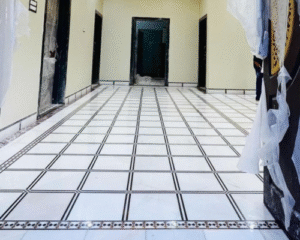Is marble heat-resistant? This is one of the most frequently asked questions by homeowners and designers when considering marble for countertops, flooring, or fireplaces. Heat resistance refers to a material’s ability to withstand exposure to hot items, sudden temperature changes, or direct heat without cracking, staining, or losing its aesthetic appeal. Since marble is a natural stone formed deep within the earth, it has a moderate ability to withstand heat, but it is not completely heatproof.
At SF Marble and Granite Inc., we often guide our clients in Lowell and the surrounding areas on how marble behaves under everyday conditions. Whether it’s a hot pan in the kitchen, a curling iron in the bathroom, or the radiant warmth of a fireplace, understanding marble’s heat resistance helps you make informed design choices. With the right knowledge and care, marble can remain a timeless, elegant surface while maintaining its durability and charm.
Table of Contents
ToggleUnderstanding Marble’s Natural Properties

When asked whether marble is heat resistant, the answer depends on its composition. Marble is a natural stone formed when limestone undergoes high levels of pressure deep underground. This transformation results in a beautiful surface that is durable and elegant, but not completely heatproof. At SF Marble and Granite, we explain to our clients that marble can handle moderate heat but still requires care to maintain its long-lasting appeal.
Marble’s Mineral Composition and Heat Reaction
- Calcite – The main mineral in marble; durable but sensitive to high temperatures.
- Dolomite – Found in some marbles, adding extra strength and resistance.
- Heat Exposure – Can cause discoloration, dull spots, or surface cracks.
- Thermal Shock – Sudden temperature changes may weaken marble over time.
Although marble is considered a heat-resistant marble, it cannot be compared to a fully heatproof material. This is why sealing marble regularly and avoiding direct exposure to extreme heat is highly recommended. Unlike laminate flooring, which may warp or peel under heat, marble offers timeless beauty with moderate resistance, making it a practical choice when paired with proper care.
How Heat Affects Marble
Homeowners frequently ask whether marble is heatproof when selecting it for kitchens and fireplaces. While marble can handle everyday heat exposure, its reaction ultimately depends on exposure levels and environment in which it’s being used.
Effects of Heat on Marble Surfaces
- Everyday kitchen heat from warm dishes is usually safe.
- Direct pans or pots can cause surface damage.
- Fireplaces may lead to gradual discoloration.
- Outdoor marble faces risks from sunlight and temperature changes.
- Extreme heat can weaken sealants and create dull spots.
While luxurious marbles bring elegance to interiors and marble mosaic adds style to backsplashes or flooring, both need protection against high temperatures. Even faux marble, though more affordable, cannot provide the same durability as natural stone. So, can marble withstand heat? Yes, but only to a moderate extent. With proper care and prevention, marble remains a beautiful, lasting choice for homes.
Marble Heat Resistance in Everyday Scenarios
Homeowners frequently ask, is marble heat-resistant enough for everyday use? The answer is yes, with certain restrictions: Marble can tolerate moderately hot items without becoming damaged; however, direct or prolonged exposure to extremely hot items could potentially damage it and its natural beauty may be affected. Being familiar with how marble performs under various household scenarios helps protect its integrity.
Everyday Uses and Heat Exposure
- Placing hot pots and pans on marble countertops can lead to stains, dull spots, or cracks.
- Small appliances like coffee machines, toasters, or air fryers are generally safe but should not be left running directly on the marble for long periods.
- In bathrooms, curling irons, straighteners, and other heated tools may cause burn marks if placed directly on the surface.
- Fireplaces, BBQ setups, and outdoor kitchens with marble features must be protected from continuous, high heat to avoid discoloration.
Although marble heat-resistance makes it suitable for many modern homes, taking preventive steps is key. Even premium stones like Greek Thassos marble can lose their shine if exposed to extreme heat without protection. Regular care, such as using trivets and reapplying sealants, along with professional floor polishing, ensures your marble remains elegant and durable for years.
When Marble Can Get Damaged by Heat
Many homeowners often ask, is marble heat-resistant? The truth is that while marble can handle some heat, it is not fully immune to damage. Understanding the situations where heat can harm marble is important if you want your countertops or floors to last for years.
Thermal Shock from Sudden Temperature Changes
Marble may crack or fracture when exposed to sudden changes in temperature. For instance, placing a hot pan directly onto a cold marble countertop can put unnecessary strain on its structure, potentially leading to hairline fractures and cracking. Unlike engineered materials, marble is a natural stone and reacts more sensitively to such changes.
Direct Flames or Extreme Heat Levels
Although marble has a higher heat tolerance than wood or laminate, direct exposure to flames or extreme heat can burn, discolor, or even weaken its surface. A black marble surface, in particular, may show scorch marks more clearly compared to lighter shades. Using trivets or heat pads can help prevent this kind of damage.
Long-Term Exposure to Repeated Heat
Constantly placing hot cookware, coffee pots, or appliances on marble can wear down its finish over time. This is different from porcelain or engineered stone, which often have added durability against high temperatures. Repeated heating cycles can dull marble’s natural shine, requiring frequent marble cleaning and even professional refinishing.
Tips to Protect Marble from Heat Damage
Homeowners often ask, is marble heat-resistant? While marble can handle some heat, it’s not fully immune. Direct exposure to very hot items may cause cracks, stains, or dull spots. Protecting your marble is key to keeping it beautiful for years.
Simple tips include:
- Use trivets, mats, and coasters – Prevents direct heat transfer.
- Avoid very hot cookware – Don’t place pans straight from the oven on marble.
- Seal surfaces regularly – A good seal from trusted stone suppliers adds protection.
- Maintain even temperatures – Sudden hot-to-cold shifts can damage marble.
At SF Marble and Granite Inc., we help homeowners choose the right stone, from timeless marble to unique options like Pitaya. With sealing and care, your marble will stay strong and stylish for years.
Is Marble Heat-Resistant? Comparing Marble with Other Stone Surfaces
Homeowners often ask: is marble heat-resistant? Marble has been trusted for centuries in kitchens, bathrooms, and flooring, but how it handles heat compared to other stones is important to know.
Marble vs Granite
Granite is stronger and more heat-resistant than marble. While marble can tolerate hot pans, repeated exposure may dull its shine or cause marks. For heavy cooking, granite is the better choice.
Marble vs Quartz
Quartz countertops are durable but made with resins that don’t resist heat well. Direct heat can burn or discolor quartz. In this case, marble handles heat better, though quartz is easier to maintain.
Best for High-Heat Use
- Granite – Best for kitchens with frequent hot cookware.
- Marble – Good heat tolerance but needs extra care.
- Quartz – Low maintenance but not ideal for high heat.
For kitchens, granite is safest. For elegance in bathrooms or living spaces, marble floor installation adds timeless beauty.
Pros and Cons of Marble’s Heat Resistance
Homeowners often ask, is marble heat-resistant when considering it for countertops, flooring, or fireplaces. While marble can handle a fair amount of heat, it’s not completely immune to damage. Below, we’ll break down the advantages and disadvantages in simple terms:
Pros
Handles moderate heat: Marble can resist warm pans, coffee mugs, or hair styling tools without immediate harm.
- Elegant appearance: Its natural beauty makes it perfect for areas like kitchens and bathrooms where style matters as much as function.
- Classic durability: Compared to softer materials, marble holds up better under occasional heat exposure.
Cons
Vulnerable to thermal shock: Sudden temperature changes, such as placing a hot pan directly on a cold surface, may cause cracks.
- Discoloration risk: Continuous exposure to heat can leave yellowish or dark marks over time.
- Maintenance required: To prevent damage, protective pads and regular sealing are essential.
Marble adds undeniable elegance to any space, but understanding its heat limits helps you care for it properly. If you want a stronger balance between durability and beauty, pairing marble with professional granite installation in key areas can provide extra peace of mind. And if heat or spills leave marks, expert services like stains out treatments ensure your stone surfaces stay flawless.
Why Choose SF Marble and Granite?
However, proper care is essential to maintain its beauty and prevent heat marks from direct contact with hot pans or appliances.
At SF Marble and Granite, we combine experience with craftsmanship to help you choose and install the right marble for your home. From elegant countertops to durable marble floor installation, our team ensures precision at every step. We not only supply high-quality stones but also guide you on how to care for them so they last for decades.
Why homeowners trust SF Marble and Granite:
- Over a decade of experience in marble and granite work
- Expert marble floor installation and countertop services
- Wide selection of premium marble and granite stones
- Skilled professionals who handle both design and installation
- Guidance on maintenance, including whether marble is heat-resistant and how to protect it
Choosing SF Marble and Granite means investing in both beauty and durability for your home.
Final Thought
Is marble heat resistant? Yes, but only moderately. While it can handle everyday heat, it’s best to use trivets and avoid direct contact with hot pans to prevent damage. Marble remains a timeless choice for kitchens, fireplaces, and bathrooms when paired with the right care.
At SF Marble and Granite Inc., we help you balance beauty with durability by offering premium marble countertops and expert installation. If you’re ready to upgrade your home with elegance and lasting value, contact us today and explore our collection!
FAQs
Is marble heat resistant for kitchen countertops?
Yes, marble is heat resistant to a moderate level, making it suitable for kitchen countertops. However, it’s best to use trivets or hot pads to avoid surface damage.
Can marble withstand heat from a fireplace?
Absolutely. Marble is commonly used around fireplaces because it can handle high temperatures. Still, sealing and proper maintenance are important for long-lasting beauty.
Does SF Marble and Granite Inc. offer heat-resistant marble installation?
Yes, at SF Marble and Granite Inc., we provide professional marble countertop and fireplace installations. Our team ensures proper sealing and care so your marble stays durable and stylish.







